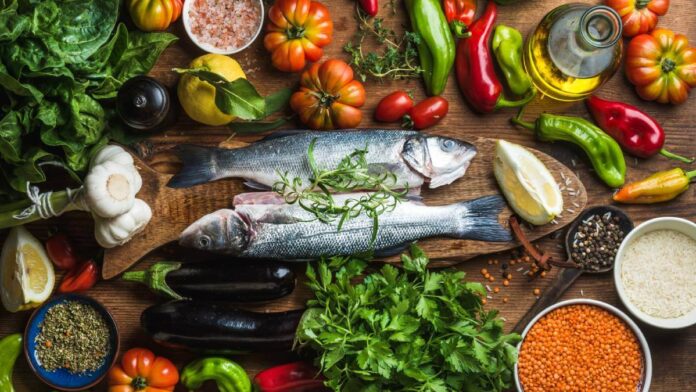The MIND diet, short for “Mediterranean-DASH Intervention for Neurodegenerative Delay,” meshes the principles of two renowned dietary patterns: the Mediterranean and DASH (Dietary Approaches to Stop Hypertension) diets. It is designed to reduce the risk of dementia and loss of brain function as you age.
The diet was initially recommended for healthy older adults. But its scope has broadened to include octogenarians who have experienced a stroke, proving its versatility and potential benefits across a wider demographic.
Many experts regard the Mediterranean and DASH diets as two of the healthiest. Research has shown they can lower blood pressure and reduce the risk of heart disease, diabetes, and several other diseases.
10 brain-healthy foods that make up the MIND diet
1. Leafy green vegetables: these should be a staple in your diet, with a goal of six or more servings per week. Think spinach, kale, and collard greens – they’re not just for salads but can be incorporated into a variety of dishes.
They are rich in vitamins, minerals, and antioxidants. They also provide essential nutrients such as vitamin K, folate, and lutein, which have been linked to improved cognitive function and a reduced risk of cognitive decline.
2. Other vegetables: in addition to leafy greens, try to eat another vegetable at least once per day. Choose non-starchy vegetables, such as broccoli, cauliflower, carrots, and capsicum – these are lower in calories and provide a lot of nutrients.
3. Nuts: a small handful of nuts such as almonds, walnuts, and pistachios is an excellent source of healthy fats, protein, and antioxidants. Try to get five or more servings of nuts each week. One serving is approximately 30 grams (1/3 of a cup or one handful).
4. Berries: eat berries as least twice per week. Berries such as blueberries, strawberries, and raspberries are potent sources of antioxidants, particularly flavonoids and anthocyanins. These compounds have anti-inflammatory and neuroprotective effects, helping to maintain brain health.
5. Beans: include beans, lentils, and legumes in at least four meals per week. They are rich in fibre, protein, vitamins, and minerals and are versatile enough to be the star in soups, salads, and main dishes.
6. Whole grains: aim for at least three servings per day. Whole grains can be a delicious part of every meal, from oatmeal at breakfast to quinoa at dinner.
7. Fish: the goal is at least one serving per week. Focus on fatty fish such as salmon, sardines, trout, tuna, and mackerel which are rich in omega-3 fatty acids.
8. Poultry: try to include chicken or turkey in your diet at least twice a week, but avoid the fried kind.
9. Olive oil: use it as your primary cooking oil to benefit from its brain-protective properties.
10. Wine: yes, a small amount of wine is included in the MIND diet. Moderation is key, with no more than one glass per day.
If meeting the recommended servings seems challenging, don’t feel discouraged. Studies indicate that adhering to the MIND diet to a moderate extent still correlates with a decreased likelihood of Alzheimer’s disease and cognitive decline. So, even sticking to it loosely can offer valuable benefits for brain health.
Foods you should limit
While the MIND diet emphasises what to eat, it also points out what to limit.
1. Red meat: less than four servings per week to keep saturated fats in check.
2. Butter and margarine: aim to consume less than one tablespoon (approximately 14 grams) per day.
3. Cheese: limit cheese to less than a serving a week. One serving of cheese is 40g or about the same size as your outstretched thumb.
4. Pastries and sweets: this includes most processed snack foods and desserts you can think of. These treats should be indulgences, not habits. Try to limit them to no more than four times per week.
5. Fried or fast food: the MIND diet heavily discourages fried food. Eat less than one serving per week to avoid unhealthy fats and excess calories.
Studies have found that trans fats are clearly associated with all sorts of diseases, including heart disease and Alzheimer’s disease.
Remember, you don’t have to stick to the MIND diet religiously. Research shows many people benefit from including some brain-healthy foods in their diet each week and limiting the five food groups above.
Do you include any of these brain-boosting foods in your diet? What are your favourite recipes that align with the MIND diet? Share your thoughts and experiences in the comments below, and let’s inspire each other to eat well.
Also read: Activities that best protect against dementia
Disclaimer: This article contains general information about health issues and is not advice. For health advice, consult your medical practitioner.

